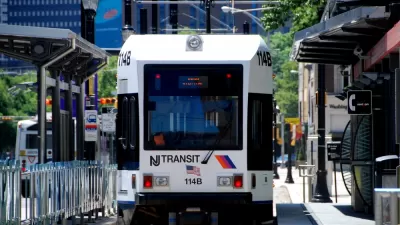New Jersey owes the Feds $271 million for canceling the infamous, $9 billion Hudson River rail tunnel. The state was ordered to pay up in not-so-subtle terms by DOT Secretary LaHood.
Just as Gov. Christie claimed that he canceled the Access to the Region's Core tunnel to protect his constituents from perceived cost over-runs, LaHood claims to be acting in the "federal taxpayers' interests" by recouping their money. A total of $600 million had been spent before Christie put an end to the project on Oct. 26, 2011
"On (April 29), the Transportation Department flatly rejected the state's arguments for refusing to repay $271 million that was spent on a project... to build a pair of rail tunnels under the Hudson River. The message to Gov. Chris Christie was blunt: Repay now or we will collect the debt the hard way. Plus interest."
"In a letter to New Jersey's senators and representatives in Congress, Ray LaHood, the transportation secretary, warned that his department had "many tools under the Debt Collection Act to recoup the lost federal taxpayer funds, including withholding future state funding from a wide variety of sources."
The state's arguments - submitted by a Washington law firm, cost the state and NJ Transit $800,000 to prepare. No word yet from Gov. Christie.
Thanks to Mark Boshnack
FULL STORY: New Jersey Must Return $271 Million Spent on Hudson Tunnel, U.S. Insists

Study: Maui’s Plan to Convert Vacation Rentals to Long-Term Housing Could Cause Nearly $1 Billion Economic Loss
The plan would reduce visitor accommodation by 25,% resulting in 1,900 jobs lost.

North Texas Transit Leaders Tout Benefits of TOD for Growing Region
At a summit focused on transit-oriented development, policymakers discussed how North Texas’ expanded light rail system can serve as a tool for economic growth.

Why Should We Subsidize Public Transportation?
Many public transit agencies face financial stress due to rising costs, declining fare revenue, and declining subsidies. Transit advocates must provide a strong business case for increasing public transit funding.

How to Make US Trains Faster
Changes to boarding platforms and a switch to electric trains could improve U.S. passenger rail service without the added cost of high-speed rail.

Columbia’s Revitalized ‘Loop’ Is a Hub for Local Entrepreneurs
A focus on small businesses is helping a commercial corridor in Columbia, Missouri thrive.

Invasive Insect Threatens Minnesota’s Ash Forests
The Emerald Ash Borer is a rapidly spreading invasive pest threatening Minnesota’s ash trees, and homeowners are encouraged to plant diverse replacement species, avoid moving ash firewood, and monitor for signs of infestation.
Urban Design for Planners 1: Software Tools
This six-course series explores essential urban design concepts using open source software and equips planners with the tools they need to participate fully in the urban design process.
Planning for Universal Design
Learn the tools for implementing Universal Design in planning regulations.
City of Santa Clarita
Ascent Environmental
Institute for Housing and Urban Development Studies (IHS)
City of Grandview
Harvard GSD Executive Education
Toledo-Lucas County Plan Commissions
Salt Lake City
NYU Wagner Graduate School of Public Service



























